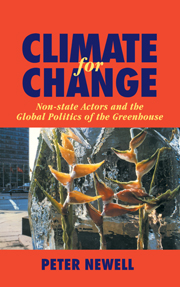Book contents
- Frontmatter
- Contents
- Acknowledgements
- 1 Politics in a warming world: introduction
- 2 Existing approaches: problems and limitations
- 3 Knowledge, frames and the scientific community
- 4 Climate of opinion: the agenda-setting role of the mass media
- 5 Climate for business: the political influence of the fossil fuel lobbies
- 6 Climate for change: environmental NGOs
- 7 Conclusion: states, NGOs and the future of global climate politics
- Appendix A List of abbreviations
- Appendix B Chronology of the international response to the issue of climate change
- References
- Index
7 - Conclusion: states, NGOs and the future of global climate politics
Published online by Cambridge University Press: 02 December 2009
- Frontmatter
- Contents
- Acknowledgements
- 1 Politics in a warming world: introduction
- 2 Existing approaches: problems and limitations
- 3 Knowledge, frames and the scientific community
- 4 Climate of opinion: the agenda-setting role of the mass media
- 5 Climate for business: the political influence of the fossil fuel lobbies
- 6 Climate for change: environmental NGOs
- 7 Conclusion: states, NGOs and the future of global climate politics
- Appendix A List of abbreviations
- Appendix B Chronology of the international response to the issue of climate change
- References
- Index
Summary
Key themes
This book has sought to develop a number of key themes around the question of the political influence of non-governmental actors upon the course of global climate politics. This section will review the main contributions in theoretical and conceptual terms. Section 7.2 will discuss the relevance of each of the ‘actor’ chapters to understandings of global climate politics, and the ways in which the analysis can usefully complement or challenge existing explanations. Section 7.3 will situate the project in broader theoretical terms within the discipline of international relations. In Sections 7.4 and 7.5, future avenues for research on NGOs in global politics will be suggested.
One feature of this book that other writers in international environmental politics have touched upon, but not comprehensively developed, is use of a regime breakdown approach in all but the media chapter (Chapter 4), where it was not thought to be relevant, given that the media are less involved in the negotiating and implementation stages of the policy process. This breakdown, while recognising that the stages identified are not temporally distinct, divides the policy process for analytical purposes into agenda-setting, negotiation-bargaining and implementation. Agenda-setting constitutes that stage of the policy process before an issue is dealt with at the international level, when the nature of the problem and the scope of action required are under consideration. The negotiation-bargaining stage refers to the politics that take place within formal international fora; the focus is on the process of bargaining and the trade-offs that are traditionally assumed to take place exclusively between states.
- Type
- Chapter
- Information
- Climate for ChangeNon-State Actors and the Global Politics of the Greenhouse, pp. 154 - 172Publisher: Cambridge University PressPrint publication year: 2000



